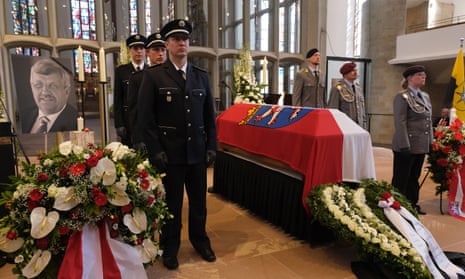A far-right extremist has confessed to murdering a pro-refugee German politician who was found dead outside his house on 2 June having been shot in the head.
Stephan Ernst, a 45-year-old German man with a string of convictions for violent anti-migrant crime, was arrested two weeks after the murder of Walter Lübcke, 65. Police had matched Ernst’s DNA with evidence recovered from the scene of the crime.
The German interior minister, Horst Seehofer, said on Wednesday that Ernst had confessed to what Seehofer called a “political murder” and that the hunt was still on for possible accomplices. Ernst reportedly said Lübcke’s pro-refugee stance was his motive.
Lübcke, a member of Angela Merkel’s Christian Democrats (CDU), was well known as a champion of refugees in Germany. He had previously received death threats due to his stance.
Ernst admitted being incensed by Lübcke’s comments at a town hall meeting in October 2015, Spiegel Online reported. At the meeting, held to discuss a new asylum seeker shelter, as hundreds of thousands of migrants and refugees entered the country, Lübcke reportedly said: “One has to stand up for values here. And those who don’t do so can leave this country any time, if they don’t like it. That’s the freedom of every German.”
It is not clear whether Ernst attended the meeting, but a video of Lübcke’s comments was reportedly circulated in far-right forums and was mentioned at rallies by the anti-immigration Pegida movement at the height of the migration crisis.
Investigators believe Ernst had contact with the far-right NPD party, as well as the neo-Nazi group Combat 18, whose members are known for promoting violence, hoarding weapons and spreading far-right propaganda and bomb-making guides.
He served a prison sentence after attempting to plant a pipe bomb outside a home for asylum seekers in 1993. He was arrested 10 years ago at a neo-Nazi march in Dortmund and sentenced to seven months’ probation for breaching the peace.
Extremists and neo-Nazis have posted messages online appearing to applaud Lübcke’s murder, stoking fears that a wider networkcould have been involved in the killing.
The killing has deeply shaken Germany and raised questions about whether the country has failed to take seriously a rising threat from neo-Nazis.
Ernst has claimed he acted alone, but Seehofer said investigators would continue to hunt for possible accomplices or co-conspirators. “The investigation of this political murder is not yet complete,” Seehofer said. He promised to “do everything humanly possible to investigate this terrible act”, adding: “We will continue to work hard to establish whether there were accessories or even accomplices. We owe that to the public.”
